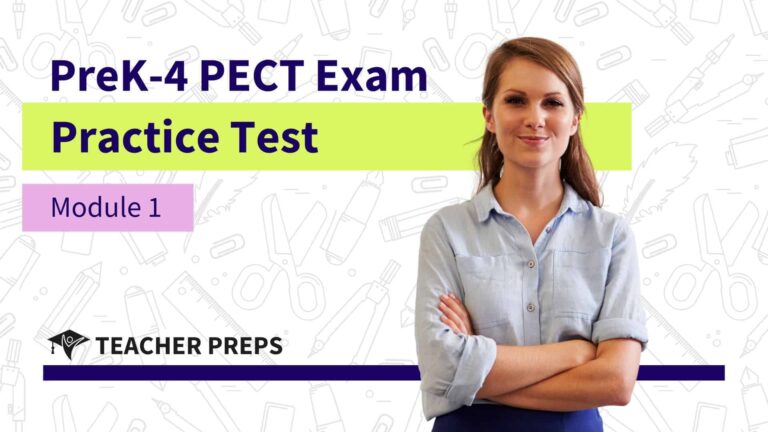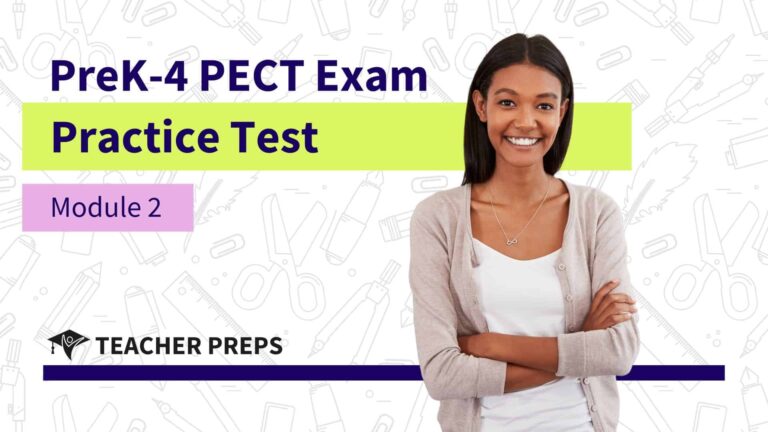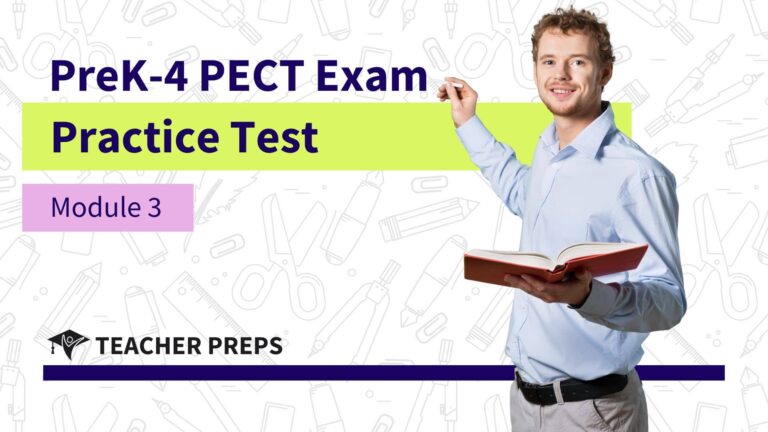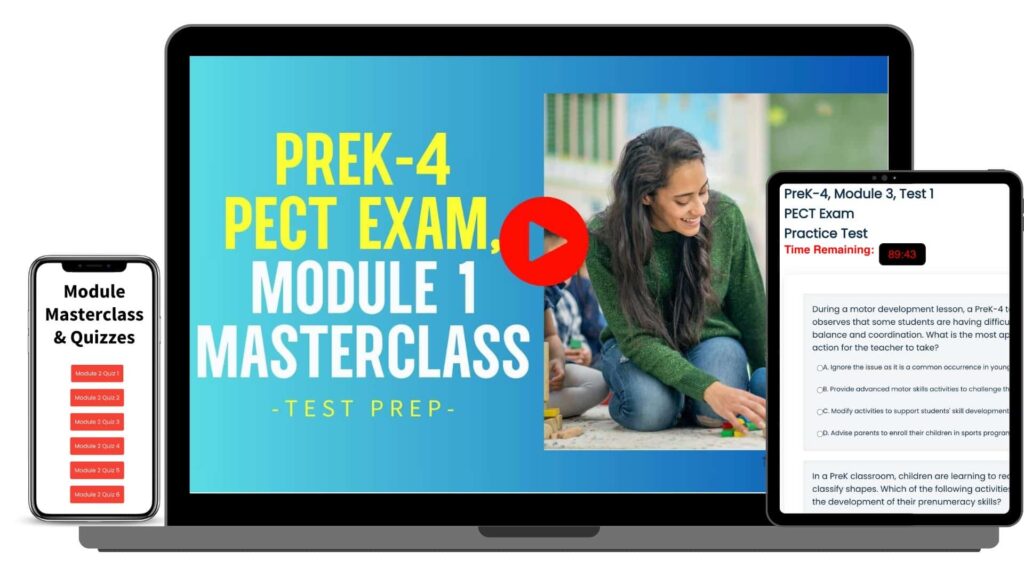
PreK-4 PECT Practice Test
Introduction
Understanding the PreK-4 PECT Exam
The journey towards becoming a certified teacher in Pennsylvania is a path filled with learning, growth, and a deep commitment to shaping the future of young minds. Central to this journey is the PreK-4 PECT exam, a pivotal step in attaining teacher certification in this state. This exam is specially designed to assess the readiness and competence of aspiring educators who will play a crucial role in early childhood education.
The PreK-4 PECT is structured into three distinct modules, each crafted to evaluate different yet equally important competencies and areas of knowledge. These modules collectively provide a comprehensive assessment of a candidate’s preparedness to teach in a PreK-4 classroom setting. The modular approach of the exam allows for a focused and in-depth evaluation of specific skills and understanding in various educational domains.
Understanding the intricacies of each module is fundamental to effective preparation. As prospective educators, it is essential to grasp not only the content and structure of the exam but also the pedagogical implications that underpin each section. This comprehensive understanding will empower candidates to approach the exam with confidence and the depth of knowledge required to excel.
In this blog post, we delve into the specifics of each module, providing insights and guidance on what to expect and how to prepare. By breaking down the exam into its core components, we aim to equip you with the necessary tools and knowledge to embark on this crucial examination with clarity and assurance. The journey to becoming a teacher is a noble and inspiring one, and understanding the PreK-4 PECT exam is a vital step on this path.
Free PreK-4 PECT Practice Test
Check your readiness for test day with these free PECT practice tests!
Overview of Module 1
Child Development, Learning, and Assessment
Module 1 of the PreK-4 PECT exam serves as a foundational pillar, focusing intensely on the domains of child development, learning theories, and assessment methods. This module is tailored to evaluate the depth of understanding that aspiring educators possess about the intricate processes of how children grow, learn, and interact with their environment during their early years.
The essence of Module 1 lies in its comprehensive coverage of developmental stages, encompassing cognitive, physical, social, emotional, and linguistic development aspects in children. Candidates are expected to demonstrate a robust understanding of these developmental stages, recognizing the typical progressions and identifying the unique aspects of each developmental phase.
Furthermore, this module places a significant emphasis on learning theories. It delves into the major theories that have shaped our understanding of child learning and development over the years. These include, but are not limited to, constructivist theories, behaviorist perspectives, and developmental milestones. A thorough grasp of these theories is critical, as they provide the framework upon which much of current educational practice is based.
Assessment methods form another crucial component of Module 1. Here, the focus is on understanding various types of assessments used in educational settings, including formative and summative assessments, diagnostic tools, and how these tools are implemented in a standards-aligned system. Selected-response questions in this module will likely explore the characteristics, uses, advantages, and limitations of these different types of assessments. The module tests the ability to select, construct, and use assessment strategies effectively, ensuring they align with the developmental needs and learning objectives of young students.
The module’s examination style predominantly features selected-response questions. These questions are designed to assess the candidate’s ability to apply theoretical knowledge of child development and learning theories in practical educational scenarios. Questions may range from identifying characteristics of developmental stages to selecting appropriate assessment methods for certain learning outcomes.
A deep understanding of the foundational theories of child development and their practical applications in educational settings is not just a requirement for passing this module, but is also essential for any effective early childhood educator. This knowledge forms the bedrock upon which successful and impactful teaching strategies are built, ensuring that educators are well-equipped to foster a nurturing and conducive learning environment for their young learners.
Overview of Module 2
Language and Literacy Development
Module 2 of the PreK-4 PECT exam zeroes in on the critical area of language and literacy development in early childhood education. This module is meticulously designed to evaluate an educator’s understanding and proficiency in facilitating the growth of language and literacy skills among PreK-4 students. It’s an essential component of the exam, reflecting the pivotal role language and literacy play in a child’s educational journey.
The range of topics covered in Module 2 is extensive and varied, offering a comprehensive look at the multifaceted nature of language acquisition and literacy instruction. Key areas of focus include:
Language Acquisition: This area delves into the process by which young children develop language skills. It covers aspects such as the progression from babbling to early word formation and sentence construction, the role of environmental and social factors in language development, and the differences between first and second language acquisition.
Literacy Instruction Strategies: Here, the emphasis is on effective methodologies and approaches to teaching reading and writing. It encompasses strategies for phonemic awareness, phonics instruction, guiding children through the stages of emergent literacy, and fostering fluency, comprehension, and vocabulary development.
Development of Reading and Writing Skills: This segment focuses on the progression of reading and writing capabilities in young children. It includes understanding how children move from recognizing letters and sounds to reading and comprehending simple texts, as well as the development of writing skills, from scribbling to forming letters and eventually writing words and sentences.
The significance of Module 2 lies in its direct relevance to classroom practice. Educators play a crucial role in fostering language and literacy skills, which are foundational to all future learning. Mastery in this area is not only about understanding the theory but also about being able to apply effective instructional strategies that cater to the diverse needs of young learners. This includes recognizing the different stages of language and literacy development and adapting teaching methods accordingly.
The ability to nurture these skills in young learners is a hallmark of effective early childhood education. Language and literacy are the tools through which children explore, understand, and interact with their world. Thus, success in Module 2 signifies an educator’s preparedness to guide children through these fundamental stages of their educational development, ensuring they have the necessary skills to thrive in their ongoing learning journey.
Overview of Module 3
Mathematics, Science, and Health
Module 3 of the PreK-4 PECT exam plays a pivotal role in shaping well-rounded educators, focusing on mathematics, science, and health education. This module is carefully constructed to assess the ability of prospective teachers to impart foundational knowledge in these critical areas to young learners. It’s a testament to the holistic approach needed in early childhood education, where cognitive, physical, and health aspects are integrated for comprehensive student development.
Key Areas of Knowledge in Module 3:
Basic Mathematical Concepts: This section evaluates the understanding of fundamental mathematics that forms the building blocks for young learners. It includes numeracy, basic operations, understanding of shapes and patterns, measurement, and data interpretation. Candidates are expected to demonstrate not only proficiency in these areas but also the ability to convey these concepts in an engaging and comprehensible manner to PreK-4 students.
Scientific Inquiry and Concepts: Science education at the PreK-4 level is all about sparking curiosity and encouraging exploratory learning. This segment assesses knowledge in basic scientific principles, the ability to conduct simple experiments, and the skills to nurture inquiry-based learning. Topics might cover life sciences, physical sciences, earth sciences, and environmental awareness, all tailored to be age-appropriate and stimulating for young minds.
Health and Physical Education: Recognizing the importance of physical well-being in overall child development, this part of the exam looks at an educator’s ability to teach basic health concepts, promote healthy habits, and encourage physical activity. It encompasses nutritional knowledge, understanding of personal hygiene, basic first aid, and the development of motor skills through physical activities.
The significance of Module 3 extends beyond mere subject matter expertise. It lies in preparing educators to impart essential skills and knowledge that foster a well-rounded development in young learners. Mathematics and science education are not just about numbers and facts; they are avenues through which children learn to think critically, solve problems, and understand the world around them. Health education plays a crucial role in developing awareness about personal well-being and cultivating lifelong healthy habits.
Success in Module 3 indicates a teacher’s readiness to guide young students through the foundational concepts of math and science, while also emphasizing the importance of health and wellness. It underscores the educator’s role in nurturing a balanced and holistic educational experience, ensuring that students are not only intellectually stimulated but also physically and mentally healthy. This module, therefore, is crucial in shaping educators who are capable of contributing positively to the overall development of their students in the crucial early years of education.
Conclusion
As we conclude our exploration of the PreK-4 PECT exam, it’s clear that each of the three modules plays a distinct and crucial role in preparing aspiring educators for the challenges and rewards of teaching in Pennsylvania.
Module 1, focusing on Child Development, Learning Theories, and Assessment Methods, lays the foundational understanding of how children grow and learn. This module emphasizes the importance of grasping developmental stages and applying various learning theories and assessment techniques in educational settings. Mastery in this module is essential for educators to create supportive and effective learning environments.
Module 2 delves into Language and Literacy Development, a critical area for fostering essential communication skills in young learners. This module requires a deep understanding of language acquisition processes, literacy instruction strategies, and the development of reading and writing skills. Success in this module signifies an educator’s capability to guide students through their early literacy journey, a fundamental aspect of their educational growth.
Module 3 rounds out the exam with its focus on Mathematics, Science, and Health Education. This module assesses the ability to teach basic mathematical concepts, engage students in scientific inquiry, and promote health and physical education. It underscores the importance of providing a well-rounded education that nurtures not only intellectual but also physical and health awareness in young learners.
Thorough preparation for each of these modules is vital to achieving success in the PreK-4 PECT exam. Understanding the content and structure of each module is just the beginning. Prospective educators must immerse themselves in the material, applying their knowledge to practical teaching scenarios and adapting their strategies to meet the diverse needs of their future students.
We strongly encourage all exam candidates to take advantage of available resources and practice materials to enhance their exam preparation. Accessing study guides, engaging in relevant workshops, participating in mock exams, and connecting with fellow educators can provide invaluable insights and support. These resources not only aid in passing the exam but also contribute significantly to the development of competent, confident, and compassionate teachers.
Remember, the journey to becoming an outstanding educator is a continuous process of learning, growth, and adaptation. The PreK-4 PECT exam is an important milestone in this journey, and effective preparation for it paves the way for a fulfilling and impactful teaching career. As you embark on this journey, embrace the challenges, celebrate the learning, and look forward to the profound impact you will have on the lives of young learners.







